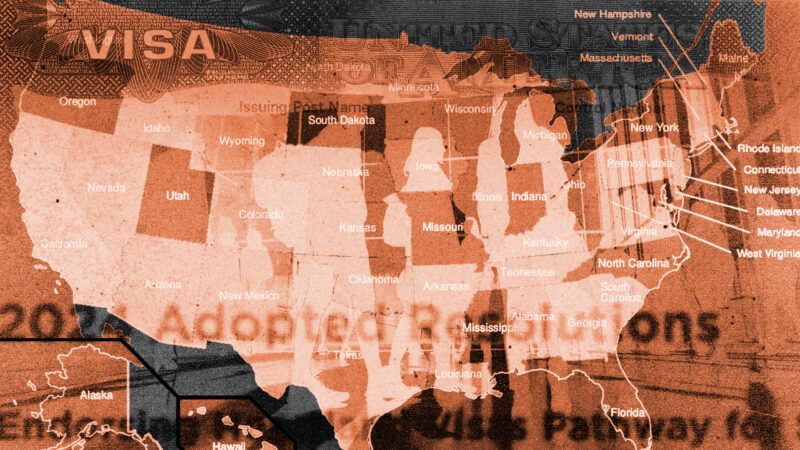America's Mayors Say the Heartland Needs Immigrants
The U.S. Conference of Mayors has endorsed "heartland visas," which would create a pathway for skilled immigrants to settle in stagnating communities.

As population and economic downturns hit many parts of the American heartland, some policy analysts and elected officials have begun to throw their support behind place-based visas that would bring high-skilled immigrants to those areas facing decline or stagnation. The idea got another nod this weekend.
The U.S. Conference of Mayors—a nonpartisan organization of mayors and other elected officials who represent cities with populations of 30,000 or more—called on federal lawmakers to establish a "heartland visa" that would bring high-skilled immigrants and immigrant entrepreneurs to communities facing population and economic decline.
"Mayors understand the critical role of high-skilled immigrants in boosting the prosperity and economic resilience of our cities," said Cleveland Mayor Justin Bibb, who sponsored the resolution. "We urge Congress to enact a Heartland Visa program to spur innovation, revitalization, and job creation in cities like Cleveland and many others throughout the Heartland."
The mayors list many reasons why a heartland visa could help communities facing decline. Immigrants found a high number of startups, comprise a high share of U.S. inventors, and frequently contribute to advances in science and technology. Population growth in the 2010s "was among the slowest of any decade in the nation's history," posing a threat to cities' "economic dynamism," "health of municipal finances," and "housing markets," the mayors note.
"The current immigration system falls short by letting in too few skilled immigrants and immigrant entrepreneurs and is heavily skewed towards a handful of major metropolitan areas," the resolution explains.
The Economic Innovation Group (EIG), a bipartisan public policy organization, pitched a heartland visa program in 2019. The group's updated framework calls for dual opt-in, where "eligible counties must opt into the program, while visa applicants could apply to the participating region of their choice." Eligible counties could be facing population decline or slow growth or could have hit their peak populations before 1980. "Places with high-cost, restrictive housing markets would not be eligible," the report says. Visa holders would need to live in an eligible area for a determined period of time, but they could work remotely.
The framework proposes an annual floor of 100,000 visas, each one good for three years and renewable for another three years. High-earning heartland visa holders "would become eligible for an expedited, self-sponsored path to permanent residency free of burdensome labor market tests," notes the EIG report.
The EIG report suggests that a large number of heartland visa recipients may settle in their host communities for the long term, citing a similar program in Canada. "The share of Canadian immigrants who remain in their sponsoring province after five years averages 85 percent, with a much shorter required period of residency that is rarely enforced in practice," it notes.
Heartland visas and other place-based visas see more bipartisan support than many immigration proposals. Roughly three-quarters of voters said they'd support allowing "struggling towns and cities with shrinking populations the ability to recruit highly skilled immigrants to their region," according to an April poll conducted by Public Opinion Strategies and Americans for Prosperity, a libertarian advocacy group. Republican lawmakers have introduced state-sponsored visa bills in Congress multiple times.
Last year, two Republican governors—Indiana's Eric Holcomb and Utah's Spencer Cox—pitched state-sponsored visas as a way "to solve our national immigration crisis." Such a pathway "would give states a dynamic means to attract new residents," they wrote.
"Though border security is a national concern, and a nonnegotiable requirement of national security in a world with drug cartels and terrorists," the governors said, "we believe that states should be able to sponsor whatever immigrants serve the needs of their communities."


Show Comments (90)